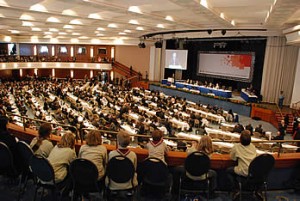~by Joe Perullo and Graham Reeder

Photo credit: UNFCCC.int
The sun is shining in the old capital of western Germany as the 36th session of the Subsidiary Bodies (Implementation and Scientific and Technical Advise) kick off on day 1 of the Bonn intersessionals.
Intersessionals are smaller meetings than COPs, they are charged with getting the work done that the annual COPs agree to and preparing for the following year’s work, the atmosphere is more casual and delegates can be seen chatting in the hallway with one another. However, that isn’t to say that the meetings are a vacation; this session has a very full agenda with crucial work to be done that will determine the future of the climate regime (and by extension, the climate).
The Convention’s new body, created last December known as the Ad-hoc Working Group for the Durban Platform for Enhanced Action, more simply the ‘ADP,’ will have its very first session during these meetings this Wednesday. This body is what will virtually replace the LCA (Ad-hoc Working Group on Long term Cooperative Action) which will finish its work this year. Like the LCA, the ADP will cover issues of Technology Transfer, Finance, Capacity Building, Adaptation, and Mitigation. Unlike the LCA, the ADP does not contain words like ‘equity’ and ‘common but differentiated responsibilities.’ Their absence from the text is the result of utter stubbornness by developed countries, particularly the US, to not agree to anything that would contain these words and threaten their race to the bottom.
Equity still has a chance though! While it is not mentioned in the ADP text itself, Common but Differentiated Responsibilities (CBDR) and Historical Responsibility are two foundational principles of the Convention, which the ADP must adhere to. Developing countries claim that, since the ADP is a subsection of the Convention, these rules still apply.
So the battle for equity is ever clear, and as the ADP begins to take form over these negotiations, we will see which interpretation of it prevails.
One clear theme of these negotiations will be ambition. The ADP is all about increasing ambition, a welcome change of tone from the LCA, which has been bogged down in incredibly slow progress and stalling. The question is, ambition from whom? As the ADP is designed, it is important to remember who has already showed ambition in reducing their emissions: the developing world.
While rich countries have complained that the poor are asking for too much and not doing enough work, the developing countries have cut more emissions that the entire developed world, and have done so without being bound to legally binding emissions reductions. Rich countries (the US notably excluded, who couldn’t even muster ratifying the Kyoto Protocol) on the other hand have completely failed to reduce their emissions despite being legally bound to do so. While some, like the EU, have gone about hiding their mess under the rug with loopholes, offsets, and creative accounting, Canada has just gone ahead and stormed out of the room, complaining that it should be up to the world’s poor to clean up it’s mess. Canada is having too much fun playing in their tar sand-pit to stop. It is important that all countries participate in fighting climate change, but we cannot forget who has created this mess and who has the capacity to clean it up. China and India have huge populations and, on a per-capita basis, are neither rich nor major emitters, the burden of fighting climate change cannot be shifted to their shoulders and this meeting will be important for keeping the burden of responsibility where it belongs: with the rich and developed.
Lots of other work will be going on under the different bodies of the UNFCCC over the next two weeks, and we’ll be here to keep you up to date of what is going on.



